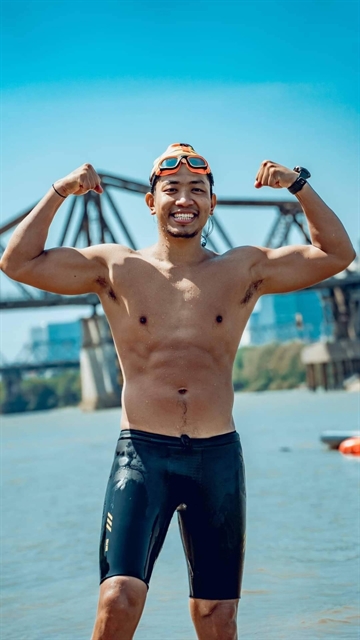 Inner Sanctum
Inner Sanctum

After a near-death swimming incident, Nguyễn Ngọc Khánh realised he didn't know how to swim in natural water and decided to impart the swimming skills to as many people as possible. The experience has helped him find his life's mission
After a near-death swimming incident, Nguyễn Ngọc Khánh realised he didn't know how to swim in natural water and decided to impart the swimming skills to as many people as possible. The experience has helped him find his life's mission.

|
| SWIMMING SAVIOUR: Nguyễn Ngọc Khánh, 35, started a network to give free swimming lessons to kids living along the Red River. Photo courtesy of Nguyễn Ngọc Khánh |
Inner Sanctum: Can you tell us why you initiated this project to teach swimming to children?
It came from my own experience. I have only known how to swim properly for the past three years. After a near-drowning incident, I realised I had to learn how to swim all over again. I want to spread this message to as many people as possible; it's an immense disadvantage when you can't swim. You risk your life on waterways or beaches.
I see that in the West, swimming is a major skill taught at school, and everyone needs to know. Whereas in Việt Nam, a country with many rivers and a long coastline, I estimate that 98 per cent of our population don't know how to swim.
When I visited beaches in Quy Nhơn or Hạ Long in summer, I saw a beach that was crowded with 2,000 - 3,000 people, but few swam out to sea because they couldn’t swim in open water.
For the past three years, I have participated in many swimming activities, and I often go swimming in the Red River. If you read in the news, you see that people drown in the Red River or the lakes in the parks every year. Last year, we helped put up warning signs at the Veterans' Wharf by the Red River and the Đuống River.
Three years ago, when I was in my 30s, I was always physically active. I played many sports, and we even had a street workout team. I had swam long distances, but my understanding was still limited.

|
| WATER SAFETY: Khánh and his volunteers hang lifebuoys on bridges in Yên Bái City last weekend where people were seen jumping in the river. By the bridge, they found a notebook with lots of debts written inside. Photo courtesy of Ngọc Khánh |
One October day in 2019, it was late in the afternoon on a reservoir in Thanh Hóa Province. I got into the water a little before 5pm, and soon after, it became dark. I was all alone, and at about two kilometres, I felt so worn out I couldn't make it to shore. I never believed in fate before that, but then I felt my life was over. I thought at the time, that God saved me.
After that incident, my wife cried her heart out. My family and my mother banned me from swimming. For six months after, I always had nightmares at night.
Then I decided that I didn't know how to swim methodically, and started to learn all over again.
But I was so stubborn that I couldn't make myself sign up for any class. I was too embarrassed people would laugh at me behind my back, 'Oh, that guy, in his 30s and not knowing how to swim,’ was what I thought people would say.
So I decided to frequent all the swimming pools in Hà Nội, trying to approach everyone after watching them swim and ask them to teach me. I learned from everyone I thought to have good skills and techniques. I learned from everyone from an 8-year-old to a retired pro swimmer in his 80s.
After six months of self-training with great improvement, I decided to go back to the open water.
Inner Sanctum: Why the Red River?
Red River is a very sacred river for Hà Nội. It's very beautiful and mighty. It's wonderful to swim in the Red River because it has waves and whirls, and the current is not the same 365 days of the year. Sometimes you even get to swim against tides from the sea that come upstream. I love swimming in the Red River.
I've had many beautiful memories in the river. I've done swimming from midnight to 8 in the morning. I've organised swimming to greet the dawn in the river from 10pm until 6am the following day, or swimming from 3am until 9am in summer and winter. When it gets very cold in the north, we put on costumes to keep ourselves warm to swim.
We were few people at first, but now we have nearly 5,000 people joining our club Discovery Swim.
I also changed my family's attitudes: my 69-year-old mother, who banned me from swimming after my accident, asked to come swimming with me to relieve her back pain. My wife, who felt so tired and exhausted when she was 7 months pregnant with our youngest daughter, felt much more comfortable after resting on her back in the water and now enjoys swimming in the river. Our two boys, aged 6 and 8, now ask to come with me to the river.
Many people think the Red River is polluted. But I don't think so. The Red River is beautiful all year round. It's been only three years that I have often gone there, and I've come to love it. Since I have received so much from it, I now want to give back.
Inner Sanctum: Do you see a future when everyone can swim?
I have met many pro swimmers, but many only trained in the pools. When they still had to prepare for competitions, for medals, they were overworked too much, too often. Some had to work up to 200 or even 300 per cent of their capacity for a long time, and then after that, their physical abilities went down.
So when they retired, they became fed up with water. They did not want to swim anymore because they did it too much. It's so sad that they do not wish to swim again.
None of the pro swimmers I met had experienced a swirl in the Red River. They don't know about the temperature shock underwater or about getting cramps during swimming in open waters. Some had long hours swimming in the pools, but when they got out to rivers or the sea, they were not used to facing unexpected factors like strong waves or unpredictable currents.
I've taken a young woman to the river. She could swim well in the pool for hours and didn't feel tired. At some point, she became the best in her pool. I told her to tie a buoy at her waist. She could grab the buoy if anything happens, and I'd be swimming beside her.
After we swam out for about 100m, she screamed, saying, “No, no swim anymore.” I told her to hold on to the buoy, but somehow she became so scared that her muscles went stiff. I called her, but she didn't respond. I waited for dozens of seconds, and then I swam to her. She held on to the buoy, but her face was underwater; she was choking. After we pulled her to the shore and I asked what happened, I realised that was exactly what happened to me.
When we were frightened, our heartbeat rises and leads to muscle shrinkage. Some suffer mildly as having a cramp in their legs or arms only, but for others, when they're too afraid, their bodies become squeezed, and their brain cannot tell their body what to do even though they are still conscious.
My advice is that you need to get prepared before you jump into unknown waters, always have any safety equipment with you, and a lifebuoy in this case. Never be reckless, saying that you can swim well, or you don't need any safety tools. I have learned that lesson.
Another factor is your mental status. When you're alone in the water, if you freak out, then it affects your mobility, your brain sends out signals that squeeze your muscles, and as a result, you cannot tell your limbs to move and get yourself away from danger. I've witnessed a fairly good pool swimmer roughed up by a few waves in the river become so freaked out that he couldn't swim to shore.
Swimming is the last resort for many people. When you get to an elderly age, doctors usually advise you to swim because it's a non-combat sport, and you won't get hurt playing it.
Swimming is a sport you can do from when you are born until you die. It's a wonderful sport that can cure so many illnesses and fix faults and injuries other sports cause.
I've just got back from Lào Cai, our first trip there. We've put up lifebuoys along the rivers and met our volunteers.
We've set a target that if you can swim 10km, you can say you are able to swim. Our country has more than 3,000km of coastline. During your lifetime, there will be times when you set your foot in the sea, and being able to swim is such a gift. If you like swimming, you can do it for fun, and you don't have to become a pro to train for medals or become the fastest or strongest. Swimming can cure illnesses that other sports cannot.
I believe that swimming as a sport shall prosper in our country. We have a long coastline with lots of streams, lakes and rivers. I hope that our community swimming competition or our Discovery Swim Club will spread our love for swimming to many more people.
Look at me, and I learned to swim when I was already 30 after almost drowning. If I can swim, anyone else can. Don't worry! I hope I can make this happen in a few years. VNS




